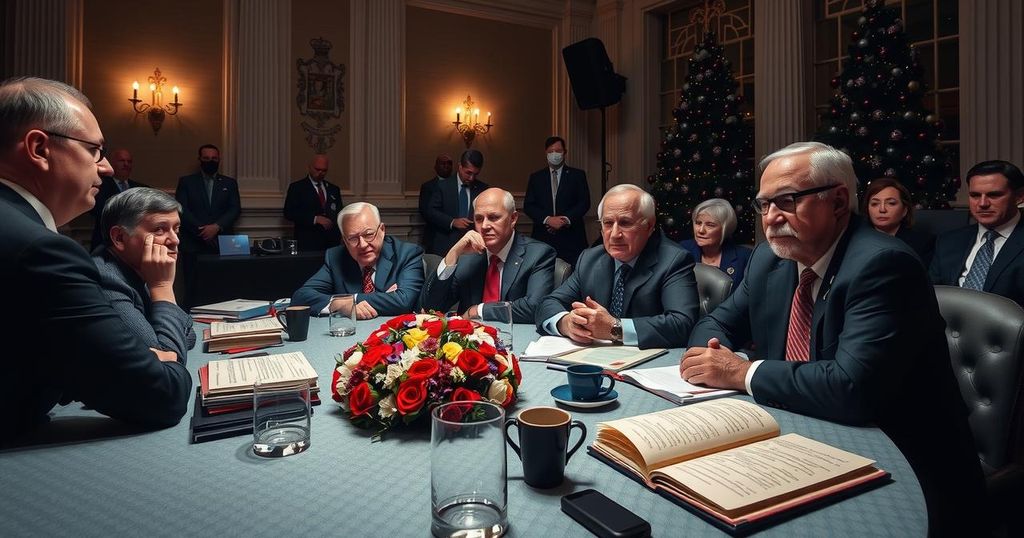157 Election Deniers Persist in Congress After Four Years of January 6 Insurrection

Four years after the January 6 insurrection, 157 members of the new Congress are identified as election deniers, reflecting the diminishing stigma associated with such a label. The article contrasts this trend with decisive accountability actions observed in countries like South Korea and Brazil. It critiques the slow response from U.S. authorities regarding accountability for elected officials involved in undermining the election, indicating a troubling normalization of anti-democratic sentiments within American politics.
Four years subsequent to the January 6 insurrection, a notable segment of Congress continues to champion the baseless claims of election denial. Donald Trump’s anticipated return to the White House is accentuated by the presence of 157 election deniers within the new 119th Congress, a drop from the 172 deniers in the previous assembly. This persistence indicates that the stigma traditionally associated with the ‘election denier’ label has diminished significantly, effectively normalizing such beliefs within Republican ranks.
Currently, the Congress comprises 137 House members and 20 senators who have either propagated falsehoods regarding the 2020 election results or actively endeavored to reverse its outcome, with significant figures including Senators Ted Cruz and Rick Scott. Outside of Washington, a substantial portion of Republican officials, including governors and attorneys general, continue to perpetuate these unfounded claims. This situation reveals a troubling trend in which the Republican Party faces little to no repercussions for their actions related to election denial, positioning it as a normative aspect of political discourse.
In contrast, international reactions to political upheaval, such as in South Korea and Brazil, showcase a more decisive accountability framework. South Korea’s National Assembly swiftly turned against President Yoon Suk Yeol following his attempt to impose martial law. Similarly, Brazil responded forcefully to January 8 riots with arrests and judicial actions against figures associated with the coup attempt against its democracy.
While initial efforts in the U.S. to hold accountable those responsible for the Capitol riot produced limited legislative momentum, an action introduced by Representative Cori Bush aimed to investigate Congress members for potential violations of their oaths of office. However, this initiative received insufficient support from congressional leaders. Furthermore, Attorney General Merrick Garland’s cautious approach to the investigation has faced criticism for focusing narrowly on individual rioters instead of addressing the broader conspiracies and the role of high-profile figures associated with the insurrection.
Despite various individuals facing legal consequences for their involvement in January 6 events, including more than 900 convictions, the absence of significant repercussions for Trump and his allies has led to a political atmosphere that lacks urgency for holding these individuals accountable. Consequently, the normalization of election denial continues to permeate American political culture, resulting in a Congress with numerous members who openly disregard the fundamental values of democracy.
The article highlights the sustained presence of election deniers in the U.S. Congress following the January 6 insurrection, focusing on a significant segment of Republican officials who continue to perpetuate falsehoods surrounding the 2020 election. It contrasts the American political response to similar struggles in other nations, demonstrating a disparity in accountability measures for elected officials engaging in anti-democratic actions. The narrative also critiques the slow judicial responses to those involved in the insurrection and underscores the normalization of harmful political ideologies within the U.S. government.
The findings encapsulated in the article illustrate a concerning dynamic where election denial has become increasingly accepted within U.S. political culture, particularly among Republicans in Congress. As evidenced by the minimal repercussions faced by these individuals and the contrasting decisive actions taken by governments in response to political crises elsewhere, the normalization of such ideologies poses a significant threat to the integrity of American democracy. The ongoing atmosphere of impunity encourages further erosion of democratic principles, as exhibited by the persistence of election deniers occupying influential political positions.
Original Source: zeteo.com







